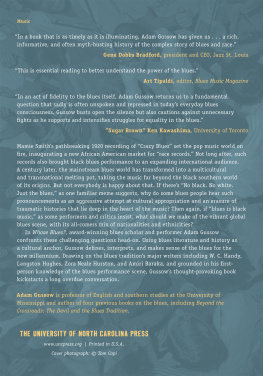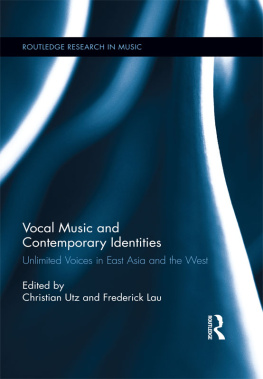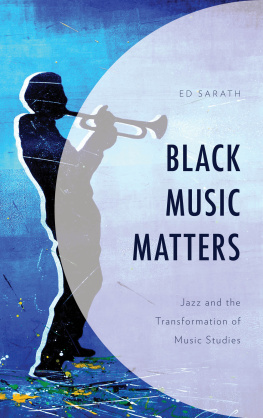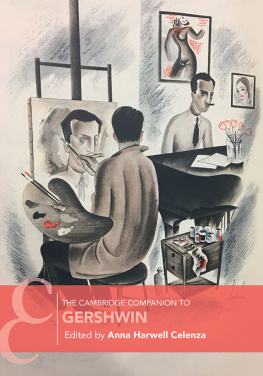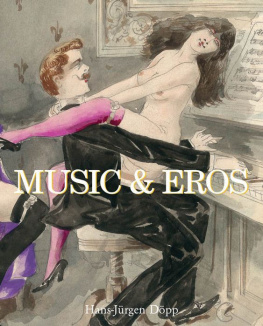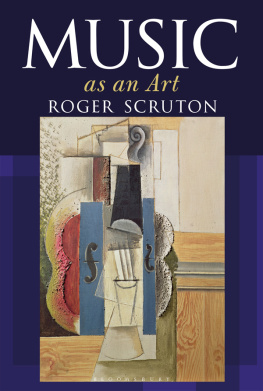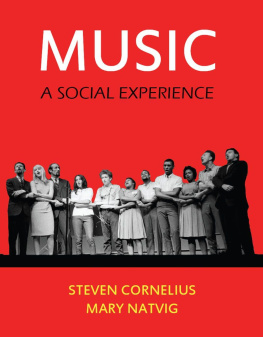Music, Difference and the Residue of Race
Routledge Research in Race and Ethnicity
1 Racial Discrimination
Institutional Patterns and Politics
Masoud Kamali
2 Black Masculinity and Sexual Politics
Anthony J. Lemelle, Jr.
3 Represent
Art and Identity Among the Black Upper-Middle Class
Patricia A. Banks
4 Blackness and Transatlantic Irish Identity
Celtic Soul Brothers
Lauren Onkey
5 Music, Difference and the Residue of Race
Jo Haynes
Music, Difference and the Residue of Race
Jo Haynes
First published 2013
by Routledge
711 Third Avenue, New York, NY 10017
Simultaneously published in the UK
by Routledge
2 Park Square, Milton Park, Abingdon, Oxon OX14 4RN
Routledge is an imprint of the Taylor & Francis Group, an informa business
2013 Taylor & Francis
The right of Jo Haynes to be identified as author of this work has been asserted by her in accordance with sections 77 and 78 of the Copyright, Designs and Patents Act 1988.
All rights reserved. No part of this book may be reprinted or reproduced or utilised in any form or by any electronic, mechanical, or other means, now known or hereafter invented, including photocopying and recording, or in any information storage or retrieval system, without permission in writing from the publishers.
Trademark Notice: Product or corporate names may be trademarks or registered trademarks, and are used only for identification and explanation without intent to infringe.
Library of Congress Cataloging-in-Publication Data
Haynes, Jo.
Music, difference, and the residue of race / by Jo Haynes. 1st ed.
p. cm. (Routledge research in race and ethnicity ; 5)
Includes bibliographical references and index.
1. World musicSocial aspects. 2. Music and race. I. Title.
ML3916.H39 2012
780.89dc23
2012016302
ISBN: 978-0-415-87921-7 (hbk)
ISBN: 978-0-203-08448-9 (ebk)
Typeset in Sabon
by IBT Global.
Contents
Acknowledgments
I would like to thank the many professionals, musicians and consumers who participated in this research and those who provided extra support through the supply of books, music and free tickets. This book would not have been written without the support of friends and colleagues in the (former) Department of Sociology at the University of Bristol, particularly Esther Dermott, for her support and very sharp eye; and to Kieran, Ruth and Jon for their advice. I am grateful to the Sociology Research Committee who, by granting me research leave, provided the necessary space to write some of this book. I would also like to thank Brett St Louis for providing timely, insightful comment and constructive critique of a draft of the manuscript, and thanks to Liv Ollin for locating some reference materials. To Domwho died in the course of writing this booksadly, I will not discuss music with him again, but thankfully, his music taste lives on. Finally, special thanks to Jonathan Joseph, for his exceptionally generous support, patience and humour throughout the writing process. Thanks and acknowledgements are given to the relevant publishers for permission to incorporate some of the material from earlier articles that is reworked here. Those articles are In the Blood: The Racializing Tones of Music Categorization Cultural Sociology 4 (1): 81100 (Sage Publications); Urban Music, Technology and Everyday Political Imaginaries in Tourism and Leisure: Local Communities and Local Cultures in the UK, pp. 99120 (Leisure Studies Association Publication No. 105); and World Music and the Search for Difference Ethnicities 5 (3): 365385.
Introduction
Music and race seem fatally entwinedin a way that involves both ongoing problems of racism and creative ethnic hybridity. Examples of their entanglement are never far from reach. When Taylor Swifta white, country and western singerwas awarded Best Female Video at the 2009 MTV Video Awards, Kanye Westan African-American hip-hop musician and producerleapt on stage and proclaimed that Beyonc deserved the award instead. Kanye West's actions and preference for an accomplished African- American female artist (instead of Swift) were described in the British press as inflaming a long-standing rivalry: between country music, a white, Middle American genre that boasts a mostly conservative audience, and the grittier urban world of hip-hop (Adams 2009). Although West's actions were misguidedhe was purported to have been drunk at the timethey were nevertheless interpreted through a racialised lens. At the very least, a fixed and narrow relationship is reinforced between music genres and racial groups in Adams' commentary. Another example: Jay-Z's scheduled performance at the 2008 Glastonbury Festival in the UK prompted debate about whether headline acts at Glastonbury should play British rock music, not rap. The support for rock was interpreted as a racist preference for white music and musicians, drawing on the historical associations between rock music, whiteness and Britishness. By implication, it reinforces the idea that rap is a black and therefore non-British musical form. In these two cases, even though there is evidence to suggest that these genresrock, rap and country musichave complex histories involving a number of ethnic groups, musical styles, cultural traditions and instances of crossover (Born and Hesmondhalgh 2000; Gilroy 1993; Lipsitz 1994); nevertheless, public debate and commentary suggests that each continues to signify exclusive national and racialised groups.
A positive entanglement is alluded to through the official narrative that which is championed within government and scholarly discourseof postwar migration to Britain and its impact on the character of contemporary British urban and popular music, whereby a non-essentialist framing of musical identities is possible. Migrants from the Caribbean, Africa and south Asia are understood to have enabled hybrid musical forms to develop that draw on and combine a range of musical styles and cultural traditions. Similarly, the official story of the historical development of popular music in the US suggests a complex genealogy shaped by a similar process of hybridisation, borne out of the migration and intermingling of numerous ethnic groups. Gilroy's (2004: 108) discussion of convivial culture captures contemporary forms of cosmopolitanism developing from below within Britainan ordinary demotic multiculturalism expressed through vital urban cultures that are emergent. Such transformation is the outcome of a shift in the political geography of culture through processes of hybridisation and the ongoing, yet uneven, settlement amongst ethnic groups.
Whereas musicgiven its mobilityis one of the more dynamic sites for hybridisation (Brah and Coombes 2000), which challenges the idea that normative racialised identities are meant to provide a fixed set of musical tastes and affinities, commonsense and media discourses continue to reflect fixed ideas about musical expression and affinity as racially embodied. People may move away from their birthplace and may listen to a variety of music, but their natural music preference and affinitytheir musical coreis often understood as the music culture they were born into. In other words, it is assumed that people are born into a culture with a particular musical sensibility that they take with them when they migrate (Negus and Velazquez 2002). The understanding of music, musical ability and affinity as inherent and differentiated derives from historical ideas about music and its racialised embodiment. Variations in music were believed to be expressions of racial difference, whereby unique sounds, instrumentation and language were thought to convey a distinct meaning and a sense of belonging and ownership (Radano and Bohlman 2000). Musical distinctions were hierarchically defined through the dichotomy of civilisation/nature, where civilisation is constructed in opposition to nature. The latter is often culturally expressed through the idea of primitivism used as a racial signifier with respect to black people in particular to denote an inherent rhythm and proximity to nature and used to underpin assumptions of European musical superiority.


